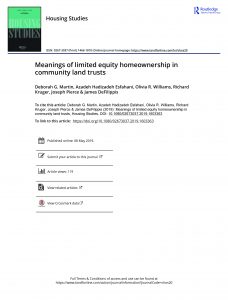Housing Studies
Co-authored by #UnequalCities Network Steering Committee member James DeFilippis
Summary: Discourses regarding homeownership in the United States emphasize housing as an economic investment. This focus fosters a number of problems, including inflated housing values, increased segregation, economic divisions, and the foreclosure crisis. Community land trusts (CLTs) put land in a non-profit trust to keep it affordable long-term. We examine CLTs as affordable housing organizations where individual residents own homes in the trust and lease the land underneath from the CLT. Interviews of CLT homeowners and staff in Minnesota, USA, show that the use value of CLT housing creates opportunities for different life choices. CLT homeowners cite stability and autonomy as the primary benefits of homeownership. They expressed newfound confidence and freedom to pursue personal goals and live less restricted lives after moving into CLT homes, a finding also emphasized by CLT staff. Limited equity housing such as CLTs can both reinforce dominant meanings of homeownership as providing security and autonomy, while also fostering access and affordability for low-income residents.
Read >> Meanings of Limited Equity Homeownership in Community Land Trusts


